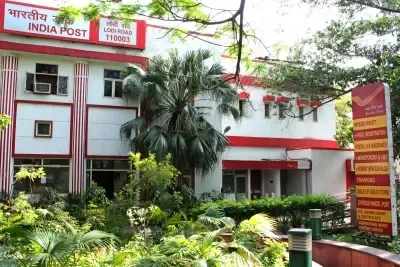Was There a Bomb Threat at Vice President Radhakrishnan's Residence in Chennai?

Synopsis
Key Takeaways
- Chennai Police confirmed the bomb threat was a hoax.
- Vice President C. P. Radhakrishnan has not lived at the Mylapore property for over a year.
- Hoax threats have caused significant disruptions in Delhi and Bengaluru.
- Authorities are investigating the source of the bomb threat emails.
- Public safety remains a top priority amid rising hoax threats.
Chennai, Oct 17 (NationPress) The Chennai Police received a bomb threat on Friday concerning the residence of Vice President C. P. Radhakrishnan in the city, which was later confirmed as a hoax.
An email claiming that a bomb was planted at the Vice President's residence in the Mylapore area was sent to the Estate Police Station.
In response to this serious security alert, senior police officials, along with the sniffer dog squad and bomb detection specialists, quickly mobilized.
Police sources indicated that C. P. Radhakrishnan, who took office as Vice President in September of this year, had vacated the Mylapore property over a year ago.
He is presently living in a rented apartment in the upscale Poes Garden area of Chennai.
Following VIP security protocols, the security teams proceeded to the Poes Garden residence, but upon arrival, they found the premises locked, hindering bomb experts from conducting an interior search.
After a preliminary area inspection, police suspected that the threat was likely a hoax.
Authorities are actively investigating the source of the bomb threat email, which is part of a recent trend of similar hoax threats targeting high-profile individuals and institutions in Chennai.
Since July, over 150 schools in Delhi and Bengaluru have received hoax bomb threat emails, causing mass evacuations and widespread panic among students and their parents.
Separate incidents have also targeted several hospitals in both cities.
According to police, the wave of threats began on July 18, when more than 100 schools, including numerous private institutions, received identical emails warning of planted explosives. Bomb disposal squads and dog units were dispatched, and many classes were suspended, but no explosives were found.
Officials reported that Delhi alone has seen over 150 such email threats this year, while Bengaluru recorded at least 25 between July and August. Most of these messages were traced to servers located outside India and sent via encrypted email services.
The Ministry of Home Affairs has instructed cybercrime units to enhance coordination and identify those responsible, with several suspects, including minors, currently under investigation.









